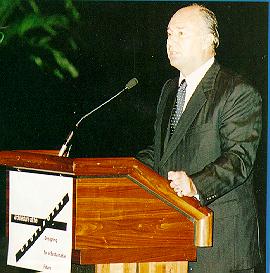H. H. The Aga Khan ADDRESSES WORLD CONGRESS OF ARCHITECTS IN CHICAGO - 1993-06-18
On the 18th of June, 1993, Mawlana Hazar Imam presented a keynote address to the World Congress of Architects in which he challenged the world's largest-ever gathering of architects to design and build sustainable environments. The Congress, held at McCormick Place in Chicago, was jointly sponsored by the International Union of Architects and The American Institute of Architects.
Addressing some 7,000 architects from around the world, Mowlana Hazar Imam highlighted the importance of buildings, spaces, settlements and cities in the process of human development. Observing that physical development problems were 'complex, pervasive and insidious in their impact', Hazar Imam stated that they deserved a clear place in development priorities, policies, and educational curricula. He urged the architects to consider how buildings could be designed and technology used in a manner that would minimize the call upon the earth's non-renewable resources.
Speaking of the ethic governing his approach to sustainability, Mawlana Hazar Imam said 'Indeed, it is my very faith - Islam - which articulates that concept - God has entrusted His world to the living, in order that they may improve it from generation to generation'.
Mowlana Hazar Imam reminded the architects that the development of sustainable environments drew not only on the physical resources of a society but also upon the cultural and artistic resources that shaped the values of that society. As an example of how the built environment is the embodiment and bearer of those values, Hazar Imam recalled the town of Mostar in Bosnia whose people were premiated by the 1986 Master Jury of the Aga Khan Award for Architecture for their rehabilitation of the old town. 'From a lifeless relic of an historic past,' said Hazar Imam, 'they turned it into a city thriving in its culture, exploding in economic opportunity. The rebuilding of Mostar illustrated how powerful cultural continuity is in contributing to human well-being. In today's tragedy of Yugoslavia, death has returned to Mostar.'
Mowlana Hazar Imam asked architects to determine how physical and cultural resources could be enriched. Conflicting demands, Hazar Imam said, would arise between one realm of resource and another. Choices would need to be made in a way that respected a people's legitimate claim to a better life, while remaining sensitive to the ecology of their setting. 'Those who build and those who advise them,' said Hazar Imam, 'make choices on the basis of the ethics and social values they hold.'
In his speech, Mowlana Hazar Imam asked the architects gathered in Chicago to focus more urgently and positively on 'rural areas in the developing world where the greatest risks to the world's ecology and to human opportunity reside.' He also encouraged them to 'guide by example and precept the millions who will build without architects every year'.
Hazar Imam noted that decisions impacting the ecology of the planet are not being made by those living and building in rural environments. He called for rural populations to be enabled to participate in their own development. Referring to health, education and rural development programs in Asia and Africa that he had sponsored since his accession to the Imamat in 1957, Hazar Imam cited the importance of having rural populations see identifiable benefits flowing from their participation at a cost they could afford.
Mowlana Hazar Imam described how his responsibilities as Imam, his concern for addressing the processes of change in contemporary society and his direct involvement in building construction in Asia and Africa, had presented him with precise and clear questions concerning the built environment. The various programs of the Aga Khan Trust for Culture were created, he said, 'to analyse the issues and search for answers. Their goal is - simply - to have a positive impact on the quality of buildings, spaces, settlements and cities in the Muslim world in particular, and in the rest of the world as well.'
The Aga Khan Trust for Culture's primary programs are those briefly described below.
The Aga Khan Award for Architecture, which constitutes the largest architectural prize in the world, is bestowed in recognition of recent outstanding architectural achievements in societies in which Muslims have a significant presence.
The Aga Khan Program for Islamic Architecture at Harvard University and the Massachusetts Institute of Technology educates architects and related professionals to meet the needs of contemporary Muslim societies.
The Historic Cities Support Program promotes and engages in the conservation, restoration and rehabilitation of buildings and public spaces in historic cities in ways that can catalyze social, economic and cultural development.
The Aga Khan Trust for Culture is part of the Aga Khan Development Network, a group of institutions working to improve living conditions and opportunities in specific regions of the developing world. These institutions, whose mandates range from the fields of health and education to architecture, rural development and the promotion of private sector enterprise, include the Aga Khan Foundation, the Aga Khan Fund for Economic Development, the Aga Khan University, the Aga Khan Health Services and the Aga Khan Education Services.
Source: U.S.A. Ismaili (July 11, 1993)
- 7521 reads
 Ismaili.NET - Heritage F.I.E.L.D.
Ismaili.NET - Heritage F.I.E.L.D.